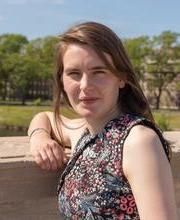Olivia Herrington
Medical Student, Yale School of Medicine

Thesis Title: A Literary Education: Tanzanian Adolescence and HIV/AIDS through Steve Reynolds’s Orodha
What Now: Yale School of Medicine student, Class of 2022
What Next: Becoming a physician
Follow Me: @odherrington (Instagram)
I knew going into college that I wanted to study the humanities, but I had assumed my major would give me a self-indulgent few years while I prepared for medical school. (I had wanted to be a doctor since age 10, when my history teacher told my class about kids our age with little to no access to medical care and let us try out MUAC bracelets—a tool used to assess malnutrition in very young children.) History & Literature showed me that this expectation could not have been more wrong. By the end of my first semester at Harvard, I had fallen in love with the department; that love has only grown. A “lunch with History & Literature” that Tim McCarthy led entitled “The Humanities and Human Rights: Why All This Matters” demonstrated that that my passion for intellectually rigorous literary analysis did not have to exist in isolation from my social values. Because of the support and inspiration of faculty and peers in History & Literature, studying the humanities at Harvard became a way of getting at the same issues I hope to address as a doctor from another angle. Because of this department, I will be a more responsible physician. It allowed me to complement my pre-medical science courses with scholarship of individual self-expression and the social context etched into it. I have learned, for example, the extent to which all of what Western biomedicine would call psychopathology is rooted in time and place. I have attempted to understand how people perceive their own lives and traumas, or how authors construct tales of daily life and of its traumatic disruption. I have hoped to better understand how trauma is written into language, both in the sense of studying foreign languages and in the sense of considering choices of syntax and vocabulary. The beauty of literary analysis, as I see it, is that it constitutes the careful study of someone’s story as they have constructed it. It is, if practiced responsibly, a fundamentally respectful practice. Culture, language, and the historical moment have as much influence on a scholar (in this case, on me) as on the creator of the work being studied. It has been an honor to be part of a concentration that has allowed me and compelled me to grapple with such deep questions of identity and history.
